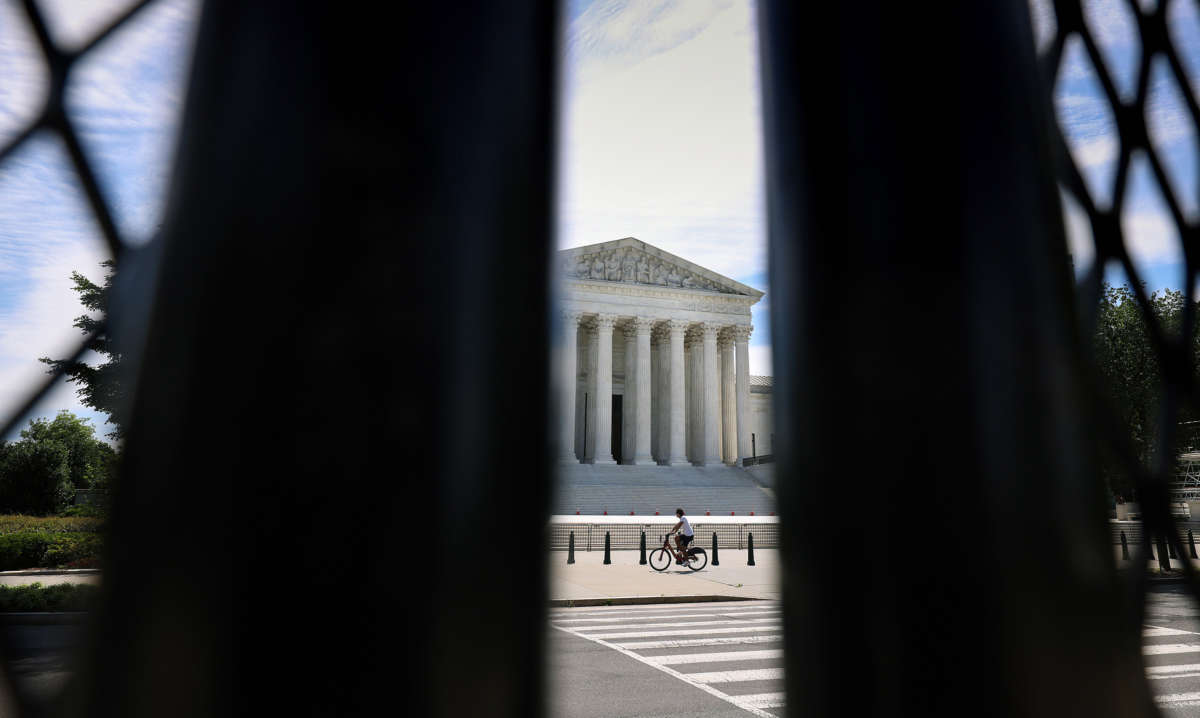This morning the Supreme Court ruled that the city of Philadelphia violated the First Amendment when the city declined to renew a contract with a Catholic social service agency that refused to consider placing youth in need of foster care with LGBTQ families. The judgment was unanimous.
While it’s crucial to consider the implications of this case — Fulton v. City of Philadelphia — for non-discrimination rules, we should also take a broader lens and recognize the harm that the foster system itself does to LGBTQ, BIPOC and working-class communities.
First, let’s look at the decision itself. While the Fulton decision is not good news, the precedents set by the details of the ruling are not as devastating as they could have been. This case had the potential to deeply harm low-income LGBTQ people, members of religious minorities, and people who have become pregnant without being married or had abortions. For example, in a worst-case scenario, the Supreme Court could have ruled that governments have to hire religious entities to provide any and all government services in discriminatory ways, so long as the motivation for discrimination is religious. That’s not what the court did.
Instead, it issued a much narrower decision. The Supreme Court acknowledged that Philadelphia prohibits discrimination based on sexual orientation in screening potential foster parents. But it also noted that the city allows the commissioner to grant exemptions to that requirement. The court ruled that because the city grants exemptions, it is not allowed to refuse a religiously motivated request for an exemption. Because the city did so, the court reasoned, that means the government’s standard wasn’t generally applicable as to religion. And that violates the constitution, the court decided.
In other words, the court chose to make the decision much more specific than it could have been. The implication of the court’s decision is that if government agencies eliminate the option for exemptions from their non-discrimination rules, they can continue to enforce those rules, even if an entity that wishes to break those rules claims to have a religious motivation for doing so.
However, although the decision is not as broadly harmful as advocates feared it might be, it does create another opening for discrimination against people receiving government services. It is not that unusual for agencies to have some process for granting exemptions to its rules, including non-discrimination rules. So the new Supreme Court ruling opens up even more opportunities for organizations to find loopholes in rules that might permit them to discriminate if they have a religious reason for it. That is especially bad news for poor and working-class people. The middle class and wealthy can often avoid the types of government services most likely to be provided in discriminatory ways. But for non-Christian foster youth, unhoused trans people, unmarried moms without any income, queer refugees, and others at the margins, there’s often no other real option. So if places providing these services shut out non-Christians, trans people, unmarried parents or queer people, it can lead to serious harm, including shorter lives.
After decisions like this one, it’s important to remember that the Supreme Court never really has the final say on any issue — the people do. Advocates and organizers can set in motion a few clear next steps based on this decision. For one, we need to pressure federal, state and local governments to make sure that they have loophole-free non-discrimination protections written into their requirements for all government contractors. For another, those of us involved in religious communities should be working internally in those communities to lift up the values of serving all those in need and struggling in solidarity with the most marginalized, including LGBTQ people.
But possibly most important, given the context of this decision, we also need to look more holistically at problems with what Dorothy Roberts calls the family regulation system. The issue of anti-LGBTQ bias in screening foster parents is not even the tip of the iceberg. We need to ask why there are so many youth in state custody in the first place. How many queer and trans parents could have kept their kids out of the system if not for poverty, incarceration, deportation or racism? How many queer and trans kids ended up in the system because their families of origin rejected them and no one else stepped forward to care for them?
How can we question all systems of child removal, whether at borders or inside them? How can we make sure that all kids, and all people caring for kids — whether parents or not — are valued and supported?
Fortunately, grassroots organizations are engaging in groundbreaking work on these issues even as the courts lag far behind. Groups like BreakOUT!, Trans Minors Rights, We are Family and Stonewall Youth are doing vital work to support LGBTQ youth. Groups like the Movement for Family Power are doing key work focused on keeping families together. It is through movements — and not through courts — that we will shape a vision of a world in which all caregivers are supported and all youth have the love and resources they need.
We have 8 days to raise $48,000 — we’re counting on your support!
For those who care about justice, liberation and even the very survival of our species, we must remember our power to take action.
We won’t pretend it’s the only thing you can or should do, but one small step is to pitch in to support Truthout — as one of the last remaining truly independent, nonprofit, reader-funded news platforms, your gift will help keep the facts flowing freely.
